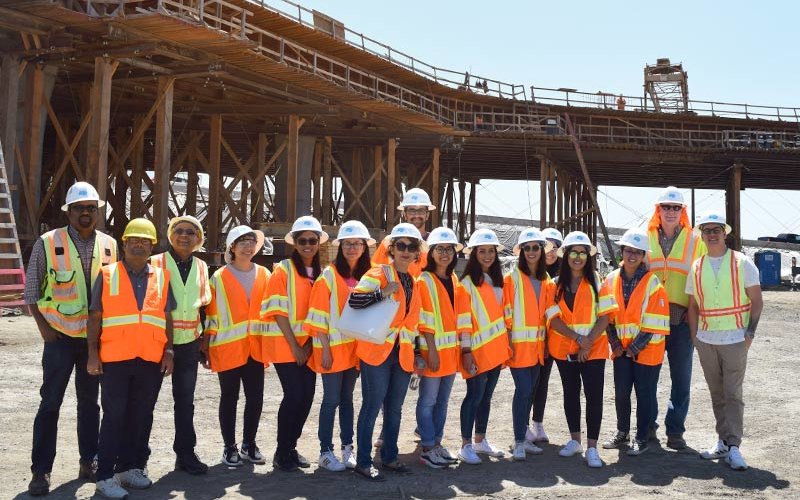
Civil engineering major Gilda Ortega had an opportunity this summer to put classroom lessons into real-world practice by creating a fictional research project to build a pedestrian bridge in Mexicali. It was an eye-opener to collaborate with her peers at Centro de Enseñanza Técnica Y Superior Universidad (CETYS) in Ensenada, Mexico.
“The experience put into perspective the economic system of another country,” Ortega said. “I was able to put into practice all the things I learned in class to create a successful project. I also learned how the economy makes or breaks the lifespan of a company and the importance of a cost benefit analysis in project design.”
Ortega was among CSUF engineering students who studied at CETYS for a week in late July and teamed up with Mexican scholars to create and present engineering research projects based on real-world needs. Students also visited three different industries — two wineries and a water park — to learn about engineering projects and systems in Mexico.
The study abroad experience was made possible through a new student exchange program, “CSUF-CETYS: Bilateral Student Mobility for Project-Based Curricular Study Abroad Program,” offered through Extension and International Programs and directed by Binod Tiwari, professor of civil and environmental engineering. The exchange program for engineering majors is supported by a grant from the 100,000 Strong in the Americas Innovation Fund, a collaboration between the U.S. Department of State, Partners of the Americas and NAFSA: Association of International Educators.
Through the program, engineering students get the opportunity to gain technical, linguistic and intercultural skills critical for today’s workforce, Tiwari said.
“One of the major benefits for students to participate in this program is the mutual collaboration between international students from Mexico and the U.S. in a curricular environment,” said Tiwari, who has stepped into the position of associate vice president of research and sponsored projects in Academic Affairs.
“Engineering education and practice is truly global. It’s important for engineering students to understand global engineering practices and engineering economics in an international context.”
The exchange program began earlier in July, where nine students from the Mexican institution came to campus and joined 28 CSUF students for a four-week course on “Engineering Economics and Professionalism,” taught by Tiwari. In the course, students learned how to prioritize and invest in an engineering project, as well as studied industry practices used in making an economic analysis of a project.
Students also visited a new bridge being built at the I-5 freeway in Norwalk, where they observed construction and met with Caltrans engineers about funding and prioritization for critical public transportation projects.
In addition to taking the course, CSUF and Mexican students engaged in service-learning activities on campus, including assisting with the Engineering Innovation program for high school students, offered by CSUF and Johns Hopkins University and taught by Tiwari.
CETYS student Valentina Arias, who is majoring in engineering cybernetics and electronics, shared that being part of the exchange program was beneficial in preparing for her future career.
“I learned a lot about economic engineering, which is something that is not included in my major, but it’s extremely useful for my career,” Arias said. “It was an amazing international experience at CSUF that allowed me to further develop myself as a student and future professional in the field of engineering.”